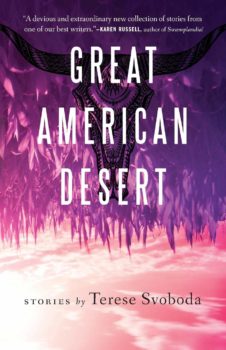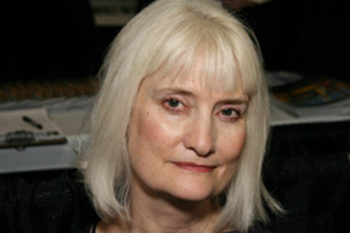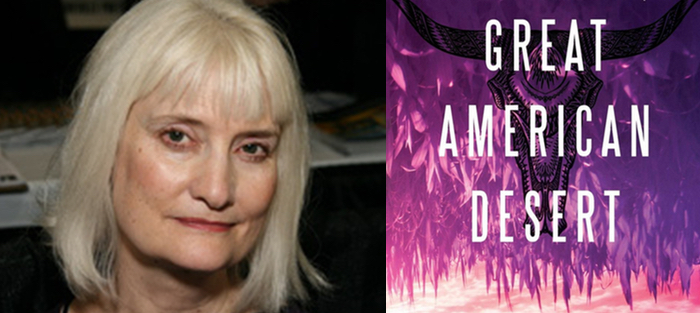Terese Svoboda is a writer of uncanny range and accomplishment. Her work includes not only the “big three” genres of fiction, poetry, and creative nonfiction, but also an opera libretto (Wet, 2005), an experimental video biography (Margaret Sanger: A Public Nuisance, 1992), and a book of translation (Cleaned the Crocodile’s Teeth: Nuer Song, 1985). She has earned a Guggenheim Fellowship in fiction (2013), a Graywolf Nonfiction Prize (2007), and the Iowa Poetry Prize (1990)—as telling an indicator as any that she has established a broad creative territory for herself, and done so at a high level.
Svoboda’s fiction includes the novels Cannibal (1994) and Tin God (2006), and the short story collection Trailer Girl and Other Stories (2001). The characters in Svoboda’ latest book, Great American Desert (published this spring by The Ohio State University Press), are hard-bitten, intense people who churn along the path to their destiny with amazing focus and ferocity. Like the titular well-digging character of her story “Dutch Joe,” they dig relentlessly toward their fate on the Great Plains that take up the geographical—and some would say emotional—center of America. We talked electronically, with her in New York and me in South Dakota, not far from her old stomping grounds in Nebraska that provided the landscapes of this collection.
Interview:
Steven Wingate: The stories in Great American Desert span an enormous stretch of time, from the pre-historic past to the future. Did you know that you had a book when you started writing them, or did you realize it when you had a certain amount of commonly themed material? In other words, how did the collection come into being?
Terese Svoboda: The book contains stories written over a period of twenty five years. During the continuous reshuffling of two hundred odd stories—alphabetical, in order of composition, best stories first—I found after organizing them chronologically that water was a theme that trickled through, from the obvious (“Dutch Joe,” which is about a well digger) to the more subterranean (the tears in the eyes of Rod in “Rods”). The very last story I wrote, “Major Long Talks to His Horse,” was written to explain the title after I finally settled on it. As you might imagine, I have quite a few stories that were not included in the book.
Climate fiction is a well-established subgenre in science fiction, with maybe the best-known example being Octavia Butler’s Parable of the Sower (1993). What are some of the touchstone books in this tradition for you—ones you might have had in mind while writing this book?
I didn’t have a touchstone, at least not a sci-fi one. My preoccupation with water began with my father being on the water board in dry Nebraska, and was piqued when South Dakota dumped 1000 truckloads of treated dirt on the Ogallala Aquifer near our land. Only the last story is sci-fi, written really because I’d never tried sci-fi before and wanted a challenge.
Because taking action on climate change often depends on a deep personal connection, I think the great masters of the short stories, those who move me in personal ways, would be the most appropriate touchstones: Flannery O’Connor, Rick Bass, J.D. Salinger, and Donald Barthelme. Issue-driven books often become predictable. I think the best approach is to write about what most concerns you. Issues will appear.
I have the same feeling about issue-driven fiction. To me it makes the work a bit too polemical and takes away some of the ambiguity that I rely on as both a reader and a writer. Yet this era feels particularly drawn to it—though this isn’t quite as pronounced in fiction as it is in poetry. Do you feel that the need to encounter issues is changing fiction’s function?
 Writers may be drawn to issues, but the writing always has to come through the portal of the self. Even science fiction must keep the reader alert by invoking the emotional. Poetry can get away with more issue-centered writing because the speaker is assumed to be the poet and thus is always close to the reader. In other words, the author is us, the reader, worrying, talking back to the issues. Traditionally written, third-person, past-tense, nineteenth-century constructed fiction is such because it can step back, put on a mask, and protect us from such close identification—at least at first, before its transparency works and the reader enters the dream.
Writers may be drawn to issues, but the writing always has to come through the portal of the self. Even science fiction must keep the reader alert by invoking the emotional. Poetry can get away with more issue-centered writing because the speaker is assumed to be the poet and thus is always close to the reader. In other words, the author is us, the reader, worrying, talking back to the issues. Traditionally written, third-person, past-tense, nineteenth-century constructed fiction is such because it can step back, put on a mask, and protect us from such close identification—at least at first, before its transparency works and the reader enters the dream.
Having an issue stands in the way of identification; for most people, it’s not them. The reader has to be convinced that it is, a process that takes time. The reader begins to experience the life of the protagonist and dons the issue along with the identity. Fingers can’t waggle. If a fiction writer breaks any of these rules, he’s writing polemic. If that’s what you mean by issue-driven fiction, then yes, fiction is changing into something else, something useful, which is not art. Art is not useful. A by-product of fiction may be that it changes someone’s mind about something—Dostoyevsky prevents us from becoming a criminal, Barthelme convinces us not to climb a glass tower—but that is not the point of the writing.
The opening story, “Camp Clovis,” is set many thousands of years ago in a pre-literary culture. What was your biggest challenge in developing that story, and how did you resist the temptation of imposing a contemporary mind onto decidedly non-contemporary characters?
I lived for months with the Nuer people in the Sudan, a very long time ago. Boys went off in the summer to camp by the river to fool around and guard the cattle. Life was very simple, at least materially. Rival camps made raids and the boys defended themselves with sticks and rocks. Cultures that close to the land haven’t changed much over thousands of years. I translated some of what they sang around the campfire, songs about bogeymen, boasting, and looking good for girls. Everyone fears the stranger, everyone seeks delight. Wells Tower’s “Everything Ravaged, Everything Burned” is another good example of meeting this challenge.
The science fiction story you mentioned, “Pink Pyramid,” bookends the story from the other direction. It’s set in a future with even fewer moorings than “Camp Clovis,” and involves more intricate world-building. How would you describe the challenge of writing these characters when compared writing those of the distant past—neither of which are knowable.
Writing “Pink Pyramid” was similar to “Camp Clovis.” Both are speculative, and each had to be “set.” But any story written outside the understood contemporary will have moments, especially historically, that will need furniture. Just not too much. Readers are very smart and often don’t want the mystery of elsewhere spoiled by too much specificity—no name brand on the hose that brings you pinkness because everybody already knows the name brand the way we know that “tissue” means “Kleenex.” The unspecific suggests universality. Too much detail also gets in the way of the emotional drive. You don’t really care what the sword is made of, you just want to know why it was wielded. Historical detail just requires research, not invention. How in the world do you dig a well?
One aspect I notice in your writing is the consistent use of one-sentence paragraphs. Lines like “Surveillance is understood” and “They whoop, whoop so loud the herd disappears.” You’re also a poet, so that economy of line—a strange phrase to use when talking about prose—makes sense. Can you talk about what draws you to that kind of figure, and other ways poetry might slip into your prose?
Thank you for noticing. A single line is forceful and dramatic and says more than it seems, positioned by itself with the white space resonating around it. It’s a kind of punctuation too, a pause. I’ve used a single sentence for a whole chapter in at least one of my novels.
I have a complicated theory about stealing from poetry, which for the last hundred years or so, has tried to Make It New all by itself for the most part, except for certain modernists like Dos Passos and Woolf. There should be similar lasting advances in fiction, more openness to the wilderness of the 21st century and not just involving the addition of emails or emoticons in the text. Poetry’s monopolies on sound and sense and sentence patterns should be broken and used for fiction’s kindling. Also, writers of fiction should remember that all things literary comes from the oral, and read their work out loud before setting it in type.
Similarly, you seem a big fan of present tense. What’s the attraction of that for you? Has it always been such a strong tendency, or did you gravitate toward it over the course of your writing life?
Cannibal, my first novel, is written in a kind of hypnotic swoon of fear that seemed to best fit the present tense. The most important job of the writer is to seduce the reader into going on and if it means unfolding the narrative to the protagonist at the same time as the reader, so be it. I’ve experimented with the past tense now and then but everything feels too over for me, the sound of the voiced alveolar stop is like a slammed door. I like writing living and breathing.
Perhaps it’s my perspective as a man that leads me to think this, but it seems that you have a lot to say about American masculinity. Two characters, in particular, struck me in this regard: Hump from “Bomb Jockey,” who disassembles bombs, and Dad from “Hot Rain,” who’s dying of old age amidst a fractious family. Those characters felt in dialogue to me. Can you talk about your relationships with those two characters—and about the institution of American masculinity, if that’s on your mind in this book.
I come from patriarchy, and I would like to have written myself out of it. Strong female forces commanded several generations. The women were bent and sometimes destroyed by the pressure to submit, and the stories, the narrative drives, kept coming up male. I have stories about women that didn’t fit in the collection; I should’ve written one about water and women to expand the book’s vision. My difficult father was dying while I was putting the book together. His brother, whom Hump is modeled on, had committed suicide ten years earlier. These were strong influences. Or do I turn away from those strong women trying to make me conform? The tempering of masculinity to accommodate the feminine takes more than a few generations.
I wanted to ask about the title and the geographical space of the Great Plains—a region we both share a lot of affinity with. What does it do to our conception of this region when we think of it as a “desert” instead of merely “plains”? Do you feel that America is going through a re-evaluation of what this region means and how it relates to other regions?
In the early nineteenth century Major Long, exasperated with the climate, had his cartographer scrawl “Great American Desert” across the region. The term kept people out of there for nearly half a century longer. Now “Great American Desert” is prescient, with its fossil water being pumped out of the ground at a phenomenal rate and desertifying whatever isn’t being flooded.
The “plains” conjures up Rothko to me, bands of neutral color topped with a James Turrell unearthly blue. Sadness and majesty. Only deserts have that horizon, those sunsets. America had better re-evaluate the region because it’s no longer the sleepy flyover zone it once was, but that’s getting into politics.
Finally, I wanted to ask an open-ended question about the role of the Great Plains in the American cultural mythos. It was a frontier, then became an archetypal “breadbasket” region. Great American Desert examines those changes, and I’m curious to hear what you think the region is transforming into now.
 With the internet, Midwesterners no longer have the excuse of isolation. Living there now allows for both the celebration of the land—and the mind. Smart people don’t have to leave, and believe me, farmers are smart. The paperwork that goes into contemporary farming is astounding, the complexity of intuiting what crops to plant where and when—it’s an art. Working the tech on the big machines is another skill that farmers have had to learn fast. That the president is undermining the Midwest with his tariffs is stupid. He wouldn’t last ten minutes on a tractor.
With the internet, Midwesterners no longer have the excuse of isolation. Living there now allows for both the celebration of the land—and the mind. Smart people don’t have to leave, and believe me, farmers are smart. The paperwork that goes into contemporary farming is astounding, the complexity of intuiting what crops to plant where and when—it’s an art. Working the tech on the big machines is another skill that farmers have had to learn fast. That the president is undermining the Midwest with his tariffs is stupid. He wouldn’t last ten minutes on a tractor.
The region has always had culture. Mari Sandoz’ Old Jules, the Swiss frontiersman with his music and orchards, and of course Cather’s appreciation of opera. So quickly we forget that people love to travel to enrich themselves, especially the Edwardians who lived during the period when the West acquired its myths. The railroad stopped at every tiny town. Why, Cather could step off the train from New York at Red Cloud! My mother took me to Denver to see the ballet, a 250-mile trip that was practically a commute when the Interstate upped the speed limit. In contrast, the block I lived on in the eighties in NYC was populated by Portuguese who seldom left it. They had everything they wanted: church, groceries, school. Cultural regionalism is to some extent always in the mind.






